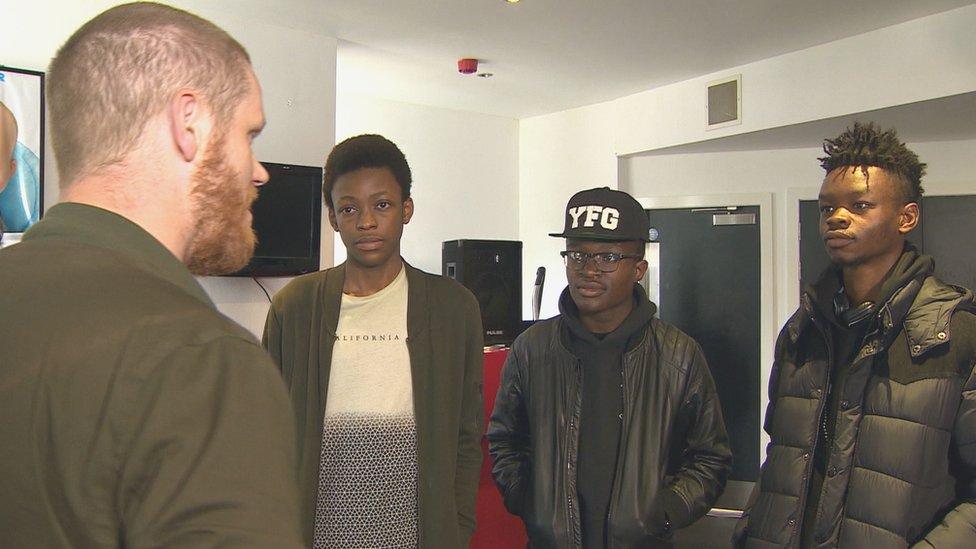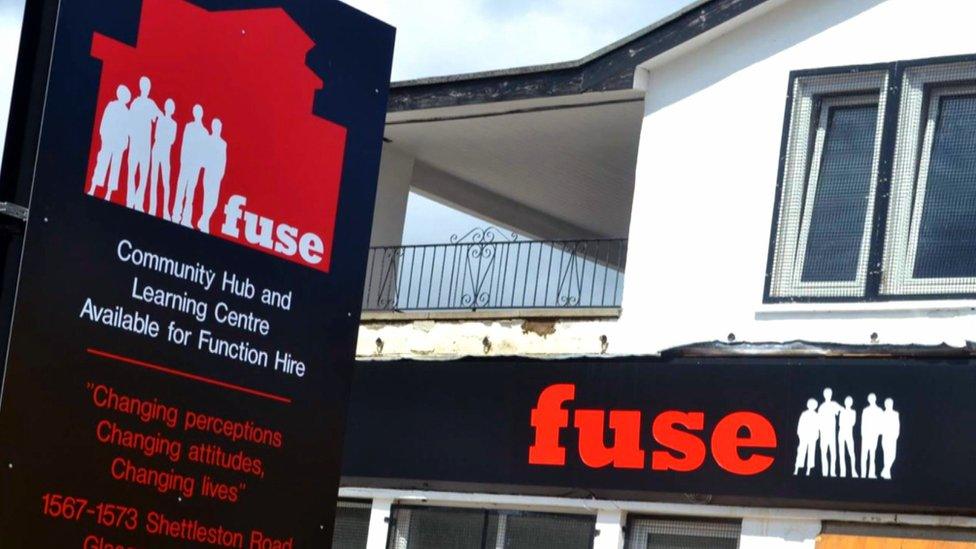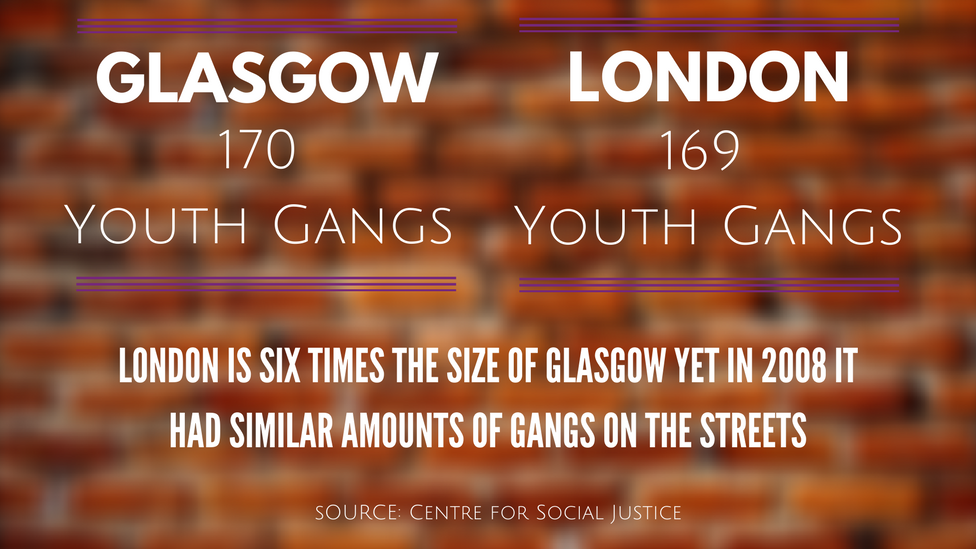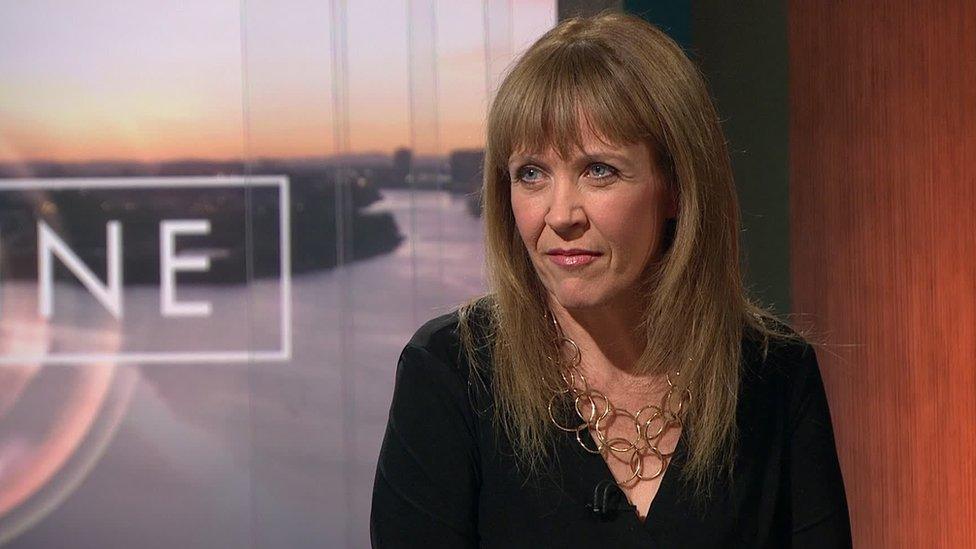Scotland's gangs: where have they gone?
- Published
Rapper Loki meets three teenagers from Glasgow who avoided gangs through music
Gangs were a familiar sight on some of Scotland's most deprived streets a decade ago.
However recent figures from the Scottish government show a decline in youth violence, indicating a cultural change in some communities.
Darren McGarvey - also known as rapper Loki - says he grew up in a community where, "gangs were part of everyday life".
BBC Scotland's Timeline programme sent him to meet three teenagers from Glasgow's east end to find out what stopped them from getting involved in gang violence.

Rapper, Loki grew up thinking gangs were part of everyday life
Prince, Tkidd and and Ace came to live in Scotland with their families in the 2000s.
Ace describes how racist attacks prompted him to consider involvement in street gangs as a means to protect himself from abuse.
"Being the black family in the neighbourhood, not everybody was as welcoming. We had stuff drawn on our windows. Our windows would get smashed twice in a month," he says.
"If you knew some of the people who could stop that from happening, obviously you're going to get close to them people. So I thought, alright, to fit in I got to do all this kind of stuff that they're doing.
"Our music kept us away from doing all that, music kind of becomes your voice. Even when you feel you can't talk to nobody else, you've always got the pen and the paper."

The Fuse Cafe in Shettleston, Glasgow
Youth focused initiatives like the Fuse Youth Café, external in the east end of the City provide programmes for young people in the area to participate in.
Gerry Baldwin who runs the centre says young people need places to learn skills they may not necessarily pick up through mainstream education.
"We try to push life skills. We think there's a gap in young people's learning. There's lots of institutions and even locals who ask why young people don't understand what's right and wrong? But how do they learn that?
"There's no gaps in timetables to learn life skills. They're expected to become adults but nobody shows them how to be it."
Social Isolation
Mr Baldwin continues, "In the 15 - 18 age group it's about providing options and raising aspirations; providing somewhere to be that's more positive. Rather than young people kicking about the streets we deal a lot now with social isolation.
"Where in the past they used to gang fight, they now stay in the house. Gaming and social media play a big part and it can affect them trying to get a job and pass exams.
"There is certainly less reported gang activity, BUT there are a few hotspots still in some areas of the city.
"It's a lot to do with the activities young people take part in, a lot of which are indoors as technology has moved on. We're not the only answer but we're one of the answers; there's projects like ourselves and there's also restorative justice. A whole bunch of strands make it work."

According to the Centre for Social Justice, in 2008 there were 170 youth gangs on the streets of Glasgow. London had 169, despite being a city six times the size.
Scottish Government figures, comparing youth prosecution rates from 2006 to 2016, indicate the amount of young people being prosecuted in Scotland's courts has fallen by 78% in ten years.
The average number of people below the age of eighteen in custody in Scotland has also fallen, by 64%.

Karen McCluskey: "They're drinking less, they're taking less drugs"
Speaking to BBC Scotland's Timeline programme, Karen McCluskey of Community Justice Scotland, and formerly of Police Scotland's Violence Reduction Unit, says young people in the country are more "aspirational" but she warns against complacency.
"They're drinking less, they're taking less drugs - all the stats and the research back that up.
"But are there still problems in the background? Of course there are. We've still got kids brought up in houses where there has been domestic abuse, where there's inequality and poverty and a whole range of other issues.
"There is no room for complacency, we have made some huge strides. Glasgow and Scotland is a different place from what it was ten years ago. Whilst that Calvinist bit of us wants to say, you know it's still bad, it's not. We need to make sure the next ten years is even better."